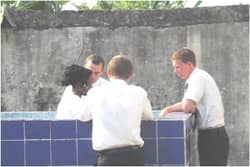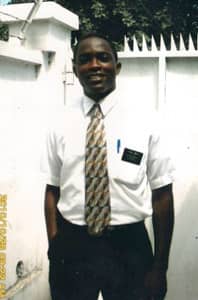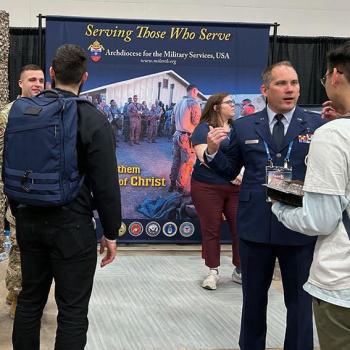Elder Jared Wigginton wrote about the poverty of Samuel, a refugee:
Samuel's father, an African, was a General for the Arab-controlled government of Sudan. Having African roots in a village just east of Darfur made his father's life difficult, as his own people viewed him as a traitor. In July of 1993, his father's gas station was burned and destroyed, and his father was kidnapped and murdered. With no source of stable income and a fear for their lives as tension was growing, he and his family fled to the Central African Republic.
After four years in Kinshasa, he met the missionaries for the Church of Jesus Christ of Latter-day Saints and decided to be baptized. Six months later, he received a phone call telling him his mother had died in Pointe-Noire, Congo. He decided to find her burial site and try to establish a new life.
On his third day here, having eaten nothing, he saw the steeple of our church. He attended the Sunday service. I was able to talk with him for a while and I took him to talk with the Branch President to see how we could help him.
My heart twinged a bit when he and President were talking in Lingala, and I watched him empty his pockets of a bar of soap in a plastic bag and a toothbrush with every bristle bent back and a deep yellow. He was showing the President everything he had to his name.
The yearning for some connection with the divine is one of our most common human experiences, and perhaps especially acute amidst poverty. A recent Mormon convert, Marceline Beri, told Elder Wigginton about her desire for peace during years of illness and abuse. He recorded her words:
 |
| Baptism of Marceline Beri |
I knew God existed. Maybe because I was desperate, I started praying. Each time I prayed, I found myself sobbing—I don't know why. I felt a big relief. I was so dirty. Spiritually, I was weak. I could not listen to the voice of God, or hope that I could progress and get myself out of my suffering.
As Beri's words show, this longing for a connection to God can be overwhelming. Africans do not shrug, curse God, and die in the face of enormous adversities. They, as do all humans, ache for meaning. And the Anglo missionaries, though their stay is brief, though they do not "become Africa" (their passports prevent that, providing a guarantee that they can leave whenever they choose), do take something of Africa back to their homes. The memories of the people abide with them.
These memories do include some rather scary people carrying AK-47s.
One of the funniest moments in The Book of Mormon Musical happens when Elder Price tries to push faith beyond his fear. He has just seen a warlord murder someone. In a parody of Maria singing "A captain with seven children—what's so scary about that?" in The Sound of Music, Elder Price sings, "A war lord who shoots people in the face—what's so scary about that?"
It may seem that Parker and Stone have gone beyond the pale with this kind of "man up" initiation for the missionary. In fact, culture shock can be violent, and I know of missionaries who witnessed murders on their first day in the field. And there are certainly warlords, revolutionaries, and refugees throughout Africa. Some even become Mormon converts. At least one revolutionary in the Congo became a missionary: Aime Mbuyi.
 |
| Elder Aime Mbuyi |
I have been communicating with Elder Mbuyi for a year now. He is still serving his mission and is currently the Assistant to the President. English is his second language (French being his first), so I have adjusted some grammar and word choice, but will let him tell his story in his own words:
Before I joined the Church, I was in a revolutionary group. We had a camp which was like a boarding school. One of the purposes of this camp was to teach us to abandon the religious system brought by white men, and to return to the religion of our ancestors. At the camp, we lit a bonfire, sang songs, and we prayed to our ancestors. Someone called out to the ancestors and other dead ones and asked them to mingle with us. All of this was initiated by an African Catholic priest who was the leader of the camp. He also changed the way of celebrating Mass. It was no longer a Catholic Mass but a combination of Catholicism and African ancestor worship. We also watched documentaries about Patrice Emery Lumumba, the youth of Soweto and others. This ex-priest was building hate in us.




